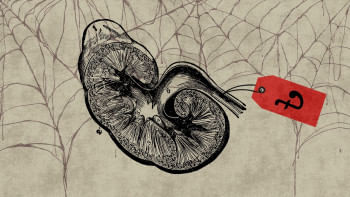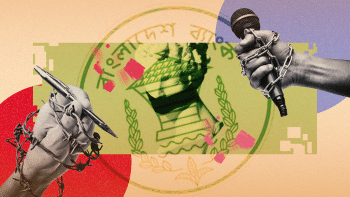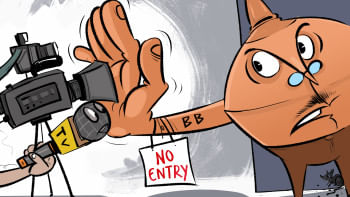There is a reason why daily news has become so depressing

We take pride in Dhaka University for its role in our national democratic struggles, and rightfully so. However, that pride can only reside in the past, in nostalgia. Today, the university campus has transformed into a slum for the educated. And then there is the anarchy of student politics, now a constant presence on public university campuses.
Nationwide, campuses have become civil war battlegrounds with conflicts erupting both between rival political parties and within factions of the same party. At Chittagong University, for example, feuds between different branches of the Chhatra League have become a disturbingly common occurrence. Local, crude weapons are often used. Young people usually want to fight—and in the absence of political opposition they resort to fighting within themselves. It's like the national election when in the absence of any formidable opposition, the party in power resorted to competing with "independent" candidates, who sprouted from the party itself.
Young people and teenagers are not doing well either, especially the females. They face trouble whenever they step outside, and confining themselves within four walls is also not favourable. Recently, three young girls orchestrated a plan to leave their homes and go to South Korea in search of a better life. They were entranced by a musical group from Korea, and their depictions on Facebook, YouTube and other online platforms. Lured by traffickers, they left home in search of freedom with some money in their hands. Before they realised that their dreams were but a mirage, they were rescued by police after their parents filed complaints.
All of these reports are sad and disheartening, as most reports coming out of the media are. Isn't there any good news? Of course, there is. But good news doesn't make headlines. It's not news when the air is normal, but it definitely is when the air is so polluted that it's impossible for people to stay healthy. Or think of Dhaka city, which is located on the banks of the Buriganga River. It's not news that the water in that river is in its normal state; but it has to be news that the water now looks like tar. There is injustice, but resistance too, though mostly ineffective and, in some cases, dangerous for the protesters.
Take, for instance, the incident in Munshiganj, where a group of boys from a neighbouring village was harassing girls at an annual sports competition in a girls' school, and three local teenagers protested. An argument ensued. Locals intervened and sent the boys home. The next day, two of the protesters were sitting near the Shaheed Minar of a government school, when the harassers (who were actually members of a teenage gang) attacked them in an attempt to avenge the "insult." One of the protesters managed to escape, but the other one was not so fortunate. He was stabbed and thrown into a nearby canal by the gang members. The boy died before he could be taken to hospital. The canal may no longer have water, but it is being used to dispose dead bodies. Locals complain that they are fed up with the atrocities of the teenage gangs. The gangs fight among themselves, but their main purpose is to harass people.
What is the root cause of this disease silently sweeping through the nation? The reason is so simple that it is easy to overlook. Even if you see it, you may not believe it. The disease is called capitalism, which has now taken the form of fascism. Capitalism is so adept at evading, deceiving, intimidating, enticing, exploiting and hiding itself that it is very difficult to recognise its ills; it is the best of all devils, and there is nothing more cunning. So, it doesn't get caught.
Once at a seminar on the progress of civilisation, a wise professor said that the wheel of history never stops; no matter what, it will keep on turning. It was very well said; history is never one to stand still. The professor stated beautifully that even if it seems like history has reached the peak of the mountain, its wheel will still keep on turning. And even if history starts to descend down the other side of the mountain, we will still see that its wheel has not stopped.
We do not deny this truth. The wheel of history has reached the top of the mountain—there's no peak to climb anymore, it is time for its descent. This is movement, yes, but it is not progress; it is regress. The professor forgot to mention that, be it history or capitalism, neither can continue to climb up nor it is possible to stand still at the top. Now the wheels will roll downwards, and it will do so at such great speed that the passengers might be thrown off and killed.
At that same seminar, another wise professor said that our hope now lies in the nation states. He believes that we should put our faith in states and in unions of states, which he preferred to call the "States Union" rather than the United Nations. However, the real truth is that the state is nothing more than a powerful tool in the hands of those who control it and use it to exploit the rest of us. Anything the state does outside of this function is done not only to safeguard that purpose, but also to maintain that function of exploitation. We must not rely on the state but on society. And if society is patriarchal, we must not settle for that either; society must be democratic and move towards socialism.
Progress must not be like a mountain, but rather like a river. If we do not understand the nature of the state, or if we misinterpret its meaning and try to promote decline as progress, we will only end up confusing and misleading people. The way in which people protesting against climate change gather and demonstrate at international conferences is certainly hopeful. They even mention that the system in question is capitalism, but they do not say that the alternative to capitalism is socialism. These green advocates want to keep the Earth green, but they do not realise that in order to do so, we must first stop capitalism and allow the free flow of socialism. As a result, the way forward remains unclear.
Translated from Bangla by Naimul Alam Alvi.
Dr Serajul Islam Choudhury is professor emeritus, Dhaka University.
Views expressed in this article are the author's own.
Follow The Daily Star Opinion on Facebook for the latest opinions, commentaries and analyses by experts and professionals. To contribute your article or letter to The Daily Star Opinion, see our guidelines for submission.

 For all latest news, follow The Daily Star's Google News channel.
For all latest news, follow The Daily Star's Google News channel. 











Comments